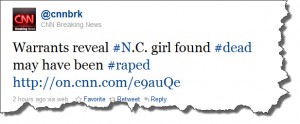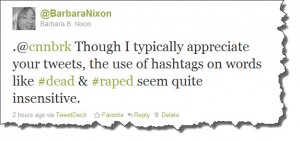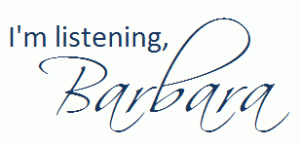[UPDATE 12.06.2010: Jen Zingsheim and Mark Story had a discussion of this blog post
in last week’s Media Bullseye Radio Roundtable podcast.]
I started this morning just like I start most mornings, with a cup of chicory coffee and a review on my Samsung Epic of what’s been written on Twitter overnight. Things looked pretty calm and innocent until I saw this tweet from CNN Breaking News:
 My first reaction to the tweet was: “How horrible for the girl!” Then I reread the tweet. My feelings for the plight of the girl intensified when I noticed that the CNN Breaking News Twitter account had used the hashtags #dead and #raped. My stomach actually turned.
My first reaction to the tweet was: “How horrible for the girl!” Then I reread the tweet. My feelings for the plight of the girl intensified when I noticed that the CNN Breaking News Twitter account had used the hashtags #dead and #raped. My stomach actually turned.
Within seconds of me reading the tweet, I responded with this:
It just seemed best to contact CNN Breaking News directly with my displeasure, rather than complaining about it without “talking” directly to them; I have yet to receive a response, but I wasn’t really expecting one via that account. I also DM’d (direct messaged) a CNN producer to let him know about the firestorm of complaints about the inappropriate hashtags.
Let me back up a little.
- If you’re new to Twitter, a hashtag (what we used to call a pound sign) is often used in front of a keyword in a tweet. It helps people to search for tweets with that keyword in them.
- For example, when I am watching a NASCAR race, I will set up a search in TweetDeck to find all tweets with the keyword #NASCAR in them. This allows me to see tweets from people who are interested in the same topic as I am — without having to follow them. When the NASCAR race is over, I simply close the column in TweetDeck, and I no longer see #NASCAR tweets, except from those whom I am already following.
Let’s get back to the tweet I saw this morning from CNN Breaking News. I have several issues with the way this tweet was written, and they all revolve around the use of the hashtags. If I saw the tweet without any hashtags, I would have likely clicked on the link to read the story and not had the gut-wrenching reaction I did.
- Why would CNN want people to search for the terms #dead or #raped? I could understand it if it was a different tweet with #CyberMonday or #WikiLeaks hashtagged. But “dead” and “raped”? Who actually searches for those terms in Twitter? And why would CNN want to be associated with this? As I mentioned in my tweet to them, it seemed insensitive.
- Was CNN trying to create a trending topic? If so, those words are not ones I’d ever want to see trend. Ever.
- And as for “#N.C.” — when hashtagging in Twitter, you have to use one word or phrase, with no punctuation, or the hashtag doesn’t work as planned. The link will only “catch” the letters/numbers that are right after the hashtag. If there’s a period, the link stops. So if someone clicks on #N.C., the search will return tweets where people have hastagged the letter N alone. Not very useful, no?
So what’s the lesson to be learned from this morning’s tweet from @CNNbrk?
Think carefully about what words you hashtag in a tweet. Will clicking on the keyword be beneficial for your readers? If not, then you can still use the words (if they are necessary to get your message across), but avoid the hashtag.
What are your thoughts about the @CNNbrk #hashtagfiasco?




I’d also like to add hashtag usage that irks me: Feeling the #need to #hashtage almost ever #word in your #entire #tweet…it’s totally #annoying! #Juststopitnow!
Maybe CNN is using automatic hashtagging software that’s why those kinds od hashtags appeared. I agree, they are quite insensitive.
That is horrible! I cannot believe that #dead and #raped are hashtags that could ever trend. You should follow up with their reply if they ever give you one. I also think that them using a hashtag incorrectly is kind of funny to me since they are more experienced than I am with Twitter and I would not make that mistake. I think I would still watch the video with or without them being inconsiderate, however they do need to check what they use hashtags for.
I feel like hash tagging those words doesn’t even make sense, because the would be used in that sentence anyway. I always thought you tagged words that aPply but are nit in the sentence. For instance “Edward Cullen is a total babe- Eclipse is the best of all four books. #Twilight”
I really loved this article, and I am finally glad someone actually took the time to write about something like this. It’s crazy to see some of the things individuals put a hashtag behind. Hopefully this article will reinforce some of the more appropriate ways to use Twitter.
Having operated a news site, I can tell you that those are the exact type stories and keywords that people want to read. They don’t read them out in public or if someone is watching, but with the privacy of their mouse and their screen, the truth is they love schaudenfraud. But they didn’t realize that I was watching them (through stats) If we posted a story about misfortune, sex, or mayhem (rape and murder included), the traffic would go off the charts.
I’m not excusing the CNN tweet. It’s deplorable. But the truth is that the answer / fault is that they’ve found it garners traffic with CNN readers.
Want to get a taste of how people lose their moral compass when they have the veil of the web? Take a look at the comments on most any YouTube video.
Chris — you bring up several good points. I do wonder if that tweet brought more traffic to the CNN website than one that more sensitively phrased might have.
That is horrible! I cannot believe that #dead and #raped are hashtags that could ever trend. You should follow up with their reply if they ever give you one. I also think that them using a hashtag incorrectly is kind of funny to me since they are more experienced than I am with Twitter and I would not make that mistake.
I think I would still watch the video with or without them being inconsiderate, however they do need to check what they use hashtags for.
Samantha — I agree; I would hope whoever was running the Twitterfeed that night would be more sensitive.
That seems quite ghoulish, Barbara. Without their response, it seems as if:
1. They don’t understand how hashtags work (the #N.C. example)
2. They were trying to get as wide an audience as possible by hashtagging those two words for people who might possibly be searching for and/or using them. But like you, I couldn’t imagine who would fall into either of those categories. Apparently, there are; there are quite a few tweets on Twitter Search with the #dead hashtag (that’s the only one I tried), though they seem to be primarily light-hearted (I only looked at the first page), and it’s even got its own page on WTHashtag… which does say that it’s “trending.”
Either way, you’d think whoever is staffing this particular CNN Twitter account would know better – or at least think better of it.
Thanks for your comment, Shonali. Since I called this to the CNN producer’s attention, I haven’t seen anything quite as sensational in @CNNbrk’s hashtags. Maybe a lesson was learned. (But the tweet is still up.)
I’d like to add that it is commonly acceptable to use a made up hashtag if it places emphasis on something or is funny. Usually these are words or phrases that no one is likely searching for.
Good reminder, Marc. I am a big fan of the #madeuphashtag, and I use them several times a week.